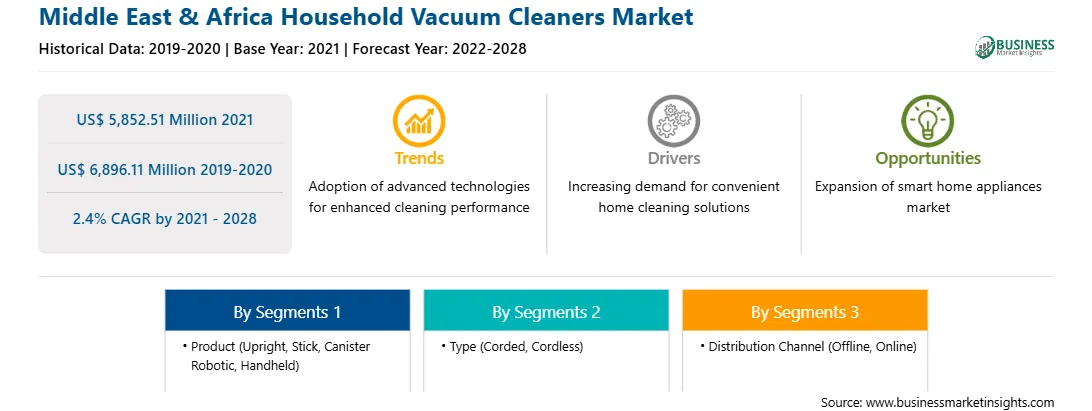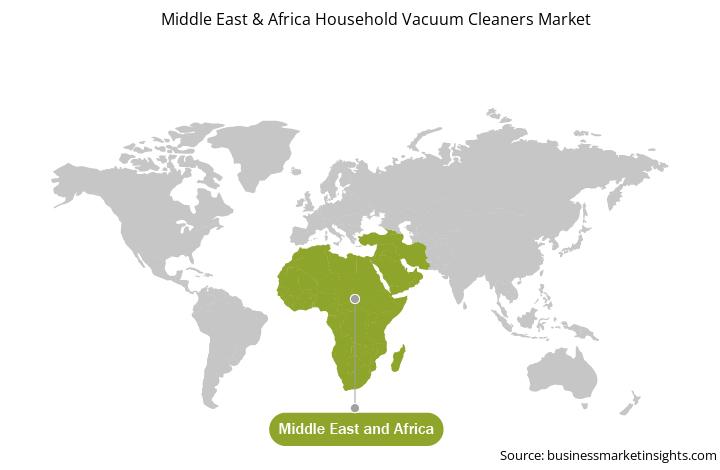The Middle East & Africa household vacuum cleaners market is a highly
In case of COVID-19, in Middle East & Africa, especially the South Africa, witnessed an unprecedented rise in number of coronavirus cases, which led to the discontinuation of household vacuum cleaners manufacturing activities. Downfall of other consumer goods manufacturing sectors has negatively impacted the demand for household vacuum cleaners during the early months of 2020. Moreover, decline in the overall household appliances manufacturing activities has led to discontinuation of household vacuum cleaners manufacturing projects, thereby reducing the demand for household vacuum cleaners. Similar trend was witnessed in other Middle East & Africa countries, i.e., UAE and Saudi Arabia. However, the countries are likely to overcome thus drop in demand with the economic activities regaining their pace, especially in the beginning of the 2021.

Strategic insights for the Middle East & Africa Household Vacuum Cleaners provides data-driven analysis of the industry landscape, including current trends, key players, and regional nuances. These insights offer actionable recommendations, enabling readers to differentiate themselves from competitors by identifying untapped segments or developing unique value propositions. Leveraging data analytics, these insights help industry players anticipate the market shifts, whether investors, manufacturers, or other stakeholders. A future-oriented perspective is essential, helping stakeholders anticipate market shifts and position themselves for long-term success in this dynamic region. Ultimately, effective strategic insights empower readers to make informed decisions that drive profitability and achieve their business objectives within the market.

| Report Attribute | Details |
|---|---|
| Market size in 2021 | US$ 5,852.51 Million |
| Market Size by 2028 | US$ 6,896.11 Million |
| Global CAGR (2021 - 2028) | 2.4% |
| Historical Data | 2019-2020 |
| Forecast period | 2022-2028 |
| Segments Covered |
By Product
|
| Regions and Countries Covered | Middle East and Africa
|
| Market leaders and key company profiles |
The geographic scope of the Middle East & Africa Household Vacuum Cleaners refers to the specific areas in which a business operates and competes. Understanding local distinctions, such as diverse consumer preferences (e.g., demand for specific plug types or battery backup durations), varying economic conditions, and regulatory environments, is crucial for tailoring strategies to specific markets. Businesses can expand their reach by identifying underserved areas or adapting their offerings to meet local demands. A clear market focus allows for more effective resource allocation, targeted marketing campaigns, and better positioning against local competitors, ultimately driving growth in those targeted areas.

The household vacuum cleaners market in Middle East & Africa is expected to grow from US$ 5,852.51 million in 2021 to US$ 6,896.11 million by 2028; it is estimated to grow at a CAGR of 2.4% from 2021 to 2028. Ensuring energy-efficient working is an emerging aspect that needs to be considered while manufacturing vacuum cleaners, to protect the environment. The traditional vacuum cleaner models consume large units of electricity. In 2016, Electrolux, the leading appliance company, manufactured vacuum cleaners that are 40% more energy efficient and save 730 gigatonne of electricity than its earlier product portfolio from 2005. The companies is further striving to develop their vacuum cleaners that are 58% more energy efficient, without compromising on their performances. The cutting-edge technology of Rowenta includes the new EffiTech Motor system, which delivers maximum energy-efficiency by picking up more dust and using less energy. Therefore, the product innovations related to vacuum cleaners are providing ample opportunities for the market players operating in the household vacuum cleaners market.
Based on product, the canister segment accounted for the largest share of the Middle East & Africa household vacuum cleaners market in 2020. Based on type, the corded segment accounted for the largest share of the Middle East & Africa household vacuum cleaners market in 2020. Based on distribution channel, the offline segment accounted for the largest share of the Middle East & Africa household vacuum cleaners market in 2020.
A few major primary and secondary sources referred to for preparing this report on the Middle East & Africa household vacuum cleaners market are company websites, annual reports, financial reports, national government documents, and statistical database, among others. Major companies listed in the report include Bissel Inc.; Electrolux; Koninklijke Philips N.V.; Stanley Black & Decker, Inc.; Haier Group; Dyson Limited; Eureka Forbes; Groupe SEB; and Miele.
The Middle East & Africa Household Vacuum Cleaners Market is valued at US$ 5,852.51 Million in 2021, it is projected to reach US$ 6,896.11 Million by 2028.
As per our report Middle East & Africa Household Vacuum Cleaners Market, the market size is valued at US$ 5,852.51 Million in 2021, projecting it to reach US$ 6,896.11 Million by 2028. This translates to a CAGR of approximately 2.4% during the forecast period.
The Middle East & Africa Household Vacuum Cleaners Market report typically cover these key segments-
The historic period, base year, and forecast period can vary slightly depending on the specific market research report. However, for the Middle East & Africa Household Vacuum Cleaners Market report:
The Middle East & Africa Household Vacuum Cleaners Market is populated by several key players, each contributing to its growth and innovation. Some of the major players include:
The Middle East & Africa Household Vacuum Cleaners Market report is valuable for diverse stakeholders, including:
Essentially, anyone involved in or considering involvement in the Middle East & Africa Household Vacuum Cleaners Market value chain can benefit from the information contained in a comprehensive market report.